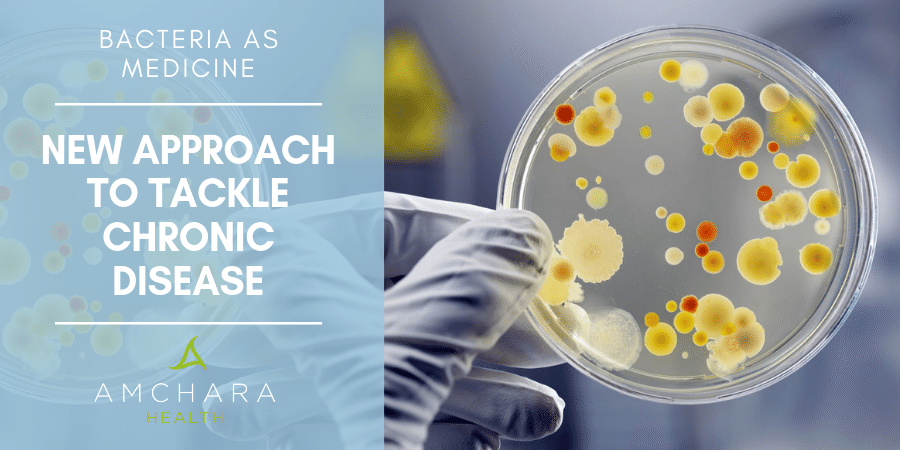Topics Covered in this article:
Health practitioners are increasingly recognising the importance of the health of our microbiome – the bacteria living in our gut.
Now, pioneering medical research is looking closely at the microorganisms which make up our microbiome with a view to developing a new class of medicines containing specific bacteria.
Known as live biotherapeutics, it’s hoped they will have the potential to fight an array of chronic diseases.
We’re dedicated to providing you with both insightful information and evidence-based content to help you on your journey to optimal health.
In this article we will take a look into the role of the microbiome, how it can be affected and so impact overall health, as well as the potential impact of new developments in medical research.
Our Incredible Microbiome
We all have our own unique population of trillions of bacteria which live, usually without making their presence known to us, in our digestive system.
Most people are totally unaware on a day to day basis they play host to around a staggering 2kg of bacteria.
It’s estimated there are at least one thousand different species which can potentially make up the microbiome, possessing more than three million genes (1).
These bacteria have evolved alongside us, and they coexist with us – their hosts – in a symbiotic relationship.
We provide them with food, and far from freeloading along life with us, they produce a host of chemical substances which interact with our bodies.
Not only that, the genes of these bacteria interact with our genes.
The Role of the Microbiome
It’s well recognised our gut bacteria influence the health of our digestive system, but we now also know they can exert effects in remote areas of our body.
The bacteria living in our gut have been likened to tiny chemical factories, producing signalling molecules which influence inflammation and prime our immune system.
The state of our microbiome is now recognised as being linked to not only digestive issues such as Crohn’s disease and IBS, but also immune issues including asthma, allergies and MS.
All this points to a very strong relationship between your overall health and what’s going on in your gut.
Is Your Gut Bacteria in Poor Shape?
It would seem we are increasingly obsessed with killing germs and bacteria in our homes and environment with antibacterial cleaning products, hand lotions and even mouthwashes.
We have grown up to regard bugs as enemies which need to be eradicated and accordingly, bacteria tend not to be associated with health.
Instead they’re usually connected with causing disease, like food poisoning, pneumonia, eye infections or skin problems.
Antibiotics are amazing drugs when used in appropriate circumstances but they have and continue to be over-used.
Antibiotics wipe out all bacteria, both good and bad, and even a single course of antibiotics can have long-term detrimental effects on the microbiome, with some studies suggesting it could be adversely affected for several years (2).
Add to this our modern lifestyles with ongoing stress, too little sleep, insufficient exercise and processed foods – all these factors can adversely impact our microbiome and cause our gut bacteria to have a hard time surviving.
The Microbiome and Natural Therapies
Knowledge of the importance of the microbiome has led to the development of probiotics, available as capsules or powders containing a range of bacteria known to live in our gut.
If the microbiome is in poor shape, adding a probiotic supplement of healthy bacteria aims to replace what’s missing.
The types of bacteria in probiotics are selected because they are naturally found in our guts and we know they play a role in supporting optimum health.
Mainstream medical research has begun to sit up and take notice of the microbiome.
The more science uncovers about the role of the gut bacteria, the more research studies are carried out which time and again serve to emphasise how crucial our microbiome is to our health.
Live Biotherapeutics – Bugs as Medicine
New knowledge about the characteristics of the various bacteria making up the microbiome has led to the development of the next generation of medicines, known as live biotherapeutics.
These utilise single strains of microorganisms to target specific illnesses.
It’s hoped they will one day be effective against a wide range of diseases involving the immune system and inflammation.
Their development is bringing about a sea change in ideas of the way we may be able to approach managing and treating chronic diseases.
Over the years, drugs have been developed to treat illnesses, for example by suppressing an overactive immune system or calming inflammation through the alteration of chemical pathways in the body.
Live biotherapeutics look to normalise the immune system or increase the release of anti-inflammatory molecules by introducing specific gut bacteria known to have these effects.
The difference between these medicines and probiotics is the use of specific strains of microbes rather than a general mixture of species.
Biotherapeutic medicines are nothing new – these drugs are derived from proteins and other substances produced by living cells such as bacteria and viruses; insulin was the first medicine to be produced by biotherapeutic methods.
It was formerly obtained from the animal pancreas tissue but nowadays insulin is usually obtained from bacteria.
The process involves adding a human insulin gene to the microbes, stimulating them to produce insulin.
Live biotherapeutics differ because they contain the bacteria themselves rather than a product of bacteria.
Our Unique Microbiome
One of the amazing things we know about the microbiome is that the makeup of the bacteria in our digestive system is totally unique to us, almost like our own personal bacterial identity card.
Of the thousand or so potential species, only around 150 will predominate in any one person.
To determine which live biotherapeutic medicine may be beneficial for a specific individual, it would therefore be necessary to first analyse a patient’s gut bacteria in order to determine the relative proportions of the different species.
This is no different to the approach Personalised Health Practitioners presently use, as most practitioners frequently use tests, such as stool tests, to analyse the makeup of the bacterial species in the microbiome.
As science is mapping the genetic makeup of each different bacterial species to discover precisely how they contribute to health, it becomes possible to home in on specific strains which may be depleted in a patient’s microbiome.
Once scientists have a comprehensive understanding of how different species of gut bacteria behave, they can be chosen for their effect on the body processes which occur in a particular disease.
The bacteria would be isolated from the faeces of healthy human donors, multiplied in the laboratory and freeze dried, waiting to be prescribed specifically for individual diseases.
Some bacteria influence pathways in the body in a similar way as existing medicines, whilst others act in completely different ways, but what they have in common is they do so without the toxicity and side effects associated with medical drugs.
Potentially such medicines could transform the future of treating chronic disease.
Live Biotherapeutics in Chronic Disease
The bacteria contained in live biotherapeutics have effects on multiple sites in the body, including the immune system.
Chemicals produced by the microorganisms once they are introduced to our digestive system could, for example, dampen down an overactive immune system.
This would be useful therapeutically in the case of allergies, which occur when the immune system reacts to harmless irritants such as pollen or food particles, as well as autoimmune conditions, when the body’s immune system attacks itself.
Or other strains could be used which produce substances to improve the functioning of an under-active immune system – this may be useful in conditions such as cancer, which is characterised by immune system impairment.
Trials have already begun on a specific strain of bacteria nattily named Enterococcus gallinarum (also named MRx0518), to evaluate its effectiveness at treating cases of various cancers in the weeks leading up to scheduled surgery (3).
The aim is to examine tumours which are subsequently removed in operations and assess the extent to which the bacteria have boosted the body’s ability to fight off the cancer by interacting with the immune system.
Further trials will be looking at other strains of micro-organisms with relation to IBS and asthma.
The Gut/Brain Axis
Although the close link between our gut and our brain was recognised in medicine as long ago as the 1800s (4), more recently science has become increasingly aware of how these separate body areas interact with each other.
We now appreciate our gut and our brain are more closely connected than we previously realised, mainly because of the influence of the gut bacteria on our emotional health.
It is often referred to as the gut/brain/microbiome axis, and for good reason.
Have you ever had a gut instinct where you have felt you know exactly what to do?
When was the last time nerves affected your digestion?
This is because the gut and the brain are communicating every second of very day, and it’s a two way process.
Along the digestive tract is located the largest network of nerves outside the brain.
It’s called the enteric nervous system, but it’s often referred to as the second brain.
The gut and the brain are connected to each other by a major nerve called the vagus nerve, which means the gut can communicate with and influence the brain and vice versa.
The gut and the brain can also talk to each other by means of hormones and by molecules produced by the immune system.
It’s believed the microbiome plays a major role in these communications by not only influencing the immune system but also by producing substances such as GABA and serotonin which help nerve cells communicate.
This means live biotherapeutic medicines have the potential of affecting diseases involving the brain such as Alzheimer’s disease and Parkinson’s.
Research is ongoing to investigate the role of certain bacteria in protecting brain cells from the degenerative changes associated with Parkinson’s.
Of interest is the ability of the bacteria to reduce inflammation or they may play a role in supporting the brain cells’ production of the neurotransmitter dopamine, which is reduced in the disease.
The Importance of the Gut Environment
It’s thought the bacteria contained in live biotherapeutics are able to live in the gut for up to three weeks.
Although transient, while they are there they will produce chemicals as part of their day to day life, which may improve the environment in the intestines for the other bacteria residing there.
Our beneficial gut bacteria prefer a specific environment. If the conditions in your intestines don’t suit them, they won’t flourish.
Think of your gut as a garden. If the soil is poor and barren, you won’t grow quality vegetables unless you use plant food regularly, and if the soil is acid, your brassicas won’t grow well.
It’s the same with your gut – it doesn’t matter how many bacteria you introduce, if the terrain is unsuitable for them they won’t multiply so well.
Personalised Health Practitioners believe the key is to not only supplement the beneficial bacteria but make sure they have sufficient food and that the environment inside your intestines is the right pH.
The obvious way to achieve this is by paying attention to what we put into our gut – in other words our food choices.
Eating a cocktail of sugary processed foods will not only feed the wrong types of bugs but won’t provide a great environment for your healthy bacteria to grow.
You’ll achieve better results if for instance you eat foods rich in natural fibre to feed the bacteria you’re trying to cultivate.
It’s also important to understand every single little bacteria plays a role in health, not simply one or two dominant strains.
Don’t forget your microbiome is as unique as your fingerprint, and although single strains of bacteria may be useful in specific disease states, research also shows a diverse range of species making up your microbiome is connected with better health (5).
Takeaway
If future medicine embraces live biotherapeutics, this can only be a good thing as more information about the role of our gut bacteria will become available.
As science progresses and we learn more about the far-reaching effect of our microbiome, it becomes increasingly clear we need to take care of our gut if we want to look after our overall health.
If you would like to explore the influence your personalised microbiome could be having on the health of the rest of your body, you may be interested in a consultation with an Amchara Health Practitioner specialising in personalised health.
By taking a thorough case history looking at your past and present lifestyle and health as well as using targeted functional tests to examine the makeup of your microbiome, your practitioner will recommend a personalised nutrition and lifestyle programme designed to optimise the health of your microbiome and ultimately your overall health.
Did you find this article useful?
We’d love to hear your thoughts, please get in touch.
READ THIS NEXT:




